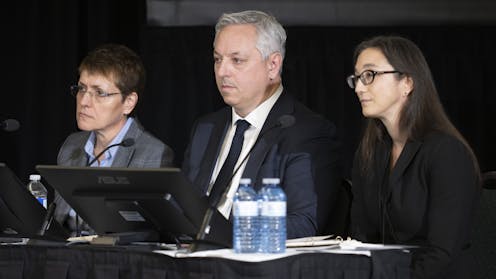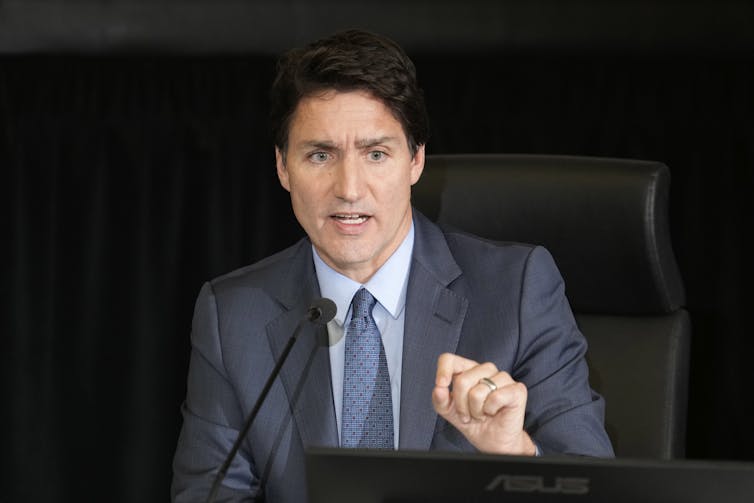
The Public Order Emergency Commission, which examined the federal government’s decision to declare a state of emergency during the occupation of the so-called freedom convoy in Ottawa, is bringing into the light debates over how bilingual Canada really is.
French-language media lamented the surprising absence of French during the recent proceedings.
In response, Prime Minister Justin Trudeau promised he would speak French during his testimony — which he did for a total of 10 minutes during the five hours of his testimony).
Although the proceedings were established in French and English by an Order in Council and, as a national inquiry, are bound by the Official Languages Act, they were conducted almost exclusively in English. Indeed, of the more than 75 witnesses who testified, only one spoke entirely in French.

Many francophone witnesses, such as proud Acadian Dominic LeBlanc, chose to testify in English.
As a discrimination researcher, I am interested in the power structures that prevent members of minority groups from asserting their rights. I seek to provide insight into the reasons for the absence of French at the commission hearings.
A bilingual judge
On the face of it, one would have had every reason to expect the Public Order Emergency Commission to be welcoming to both official languages. Its commissioner, Franco-Ontarian Judge Paul Rouleau, has long been an advocate for minority language rights. He was instrumental in developing and overseeing the implementation of pioneering access to justice initiatives for francophones in Ontario.
So it’s not surprising that Rouleau tried to set the tone for the commission by delivering an opening speech in both languages, noting that the proceedings would be accessible in both official languages and that witnesses were encouraged to testify in either French or English.
In fact, the Order in Council that created the commission gave it the mandate to “ensure that … members of the public can communicate with and obtain available services from the Commissioner simultaneously in both official languages.”
Anglonormativity
Just as researchers have observed that appointing women to head an organization is not enough to eradicate gender discrimination, simply appointing a francophone to chair the Commission is not enough to counter anglonormativity, the powerful force that prevents francophones from feeling comfortable in their language.
Alexandre Baril, a professor and expert in feminist, trans and intersectional theories, defines this concept as a “system of structures, institutions and beliefs that mark English as the norm.” According to Baril, anglonormativity is the norm by which non-English speakers are judged, discriminated against and excluded.
One of the explanations as to why, despite Rouleau’s efforts, all but one of the francophones chose to testify in French is that the commission is only a window into other anglonormative worlds.
Many francophones may have chosen to speak English because they were testifying about events in their workplaces, such as the police or the federal public service, which are anglonormative.
Several reports published by the Commissioner of Official Languages paint a picture of a federal public service where French is often marginalized and where the organizational culture is unapologetically anglonormative. Even for the most ardent francophones, it may simply be easier to recount conversations that took place in English and to describe documents written in English, in English.
Voluntary servitude or fear of contempt?
Some commentators characterized the commission’s French-speaking witnesses who testified in English as being in “voluntary servitude.” Such statements amount to victim-blaming because they fail to take into account the obvious contempt and hostility that francophone participants faced and the impact that francophobia can have on the decision to assert one’s rights to speak Canada’s minority official language.
Take, for example, Mathieu Fleury. The former city councillor, a strong advocate for francophone rights at Ottawa City Hall, chose to testify in English.
When he expressed difficulty answering a technical question because it was not in his mother tongue, a lawyer for the freedom convoy protesters mocked him. “Je m’appelle Brendan,” the lawyer said, in a derogatory manner causing the audience to laugh.
One wonders what the public’s — and the law society’s — reaction would have been if a lawyer, who has a special responsibility to uphold the values of equality protected by human rights legislation, had ridiculed a witness with a hearing impairment who spoke through an interpreter, or a witness who spoke about their religious beliefs.
Trudeau was also subject to brutal attacks by some English speakers on social media for speaking in French for 10 minutes. The choice was described as petty, irritating and a “smoke screen to dissuade people from listening.”
There was, of course, nothing malicious about Trudeau’s decision to testify in French. He had the right to speak in the official language of his choice, a language in which he grew up and which is spoken by most of the constituents in the riding he represents.
As our country’s highest federal official, he also has an obligation to work proactively to enhance the vitality of official language minority communities in Canada.

Francophobia: The last acceptable prejudice?
The hostility that the two francophones faced for their choice of testimony language is a classic example of what feminists call a double bind.
Indeed, francophones who speak French in anglonormative contexts are often labelled as difficult or ascribed bad intentions. On the other hand, francophones who try to be accommodating and speak the language of the majority face ridicule when they are unable to speak or understand at the level of a native speaker.
In the eyes of francophobes, no choice made by a francophone is a good choice because, in the end, it is not the choices of francophones they deplore but francophones themselves.
Unfortunately, discriminatory statements against francophones who speak French are rarely denounced. Worse, most human rights laws across the country offer francophones no protection against discrimination based on their language.
Is francophobia, as Jean-Benoît Nadeau has written, the last acceptable prejudice?
A recent front-page article in the Toronto Star blamed the lack of children’s medication on bilingual labelling requirements.
The headline turned out to be false. Yet even if it had been true, it is disappointing that a national newspaper would choose to blame a minority for the problem rather than the failure of governments to put in place a system that meets the necessary regulatory requirements to protect them.
With strong language rights protection, francophones are certainly privileged compared to other minorities and Indigenous Peoples in Canada. However, this unique protection may also expose francophones to particular forms of discrimination and contempt.
Rights should be a matter of levelling up rather than levelling down. Francophones should not be discriminated against for asserting their right to speak the official language of their choice.
Anne Levesque ne travaille pas, ne conseille pas, ne possède pas de parts, ne reçoit pas de fonds d'une organisation qui pourrait tirer profit de cet article, et n'a déclaré aucune autre affiliation que son organisme de recherche.
This article was originally published on The Conversation. Read the original article.







